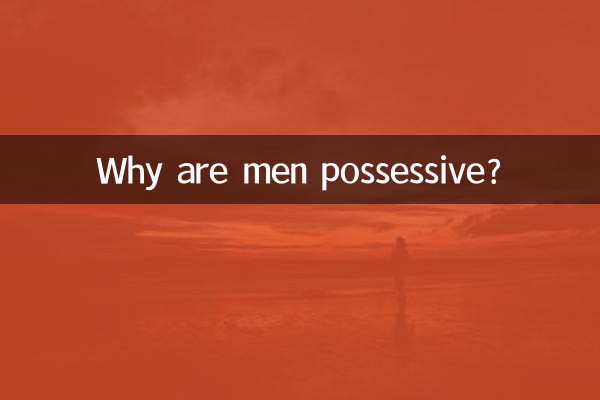Why are men possessive?
Possessiveness is a common expression in human emotions, especially among men. In recent years, discussions about male possessiveness have continued to heat up on social media and in psychology. This article will analyze the root causes of male possessiveness from the perspectives of psychology, sociology and biology, and combine the hot topics and hot content on the entire Internet in the past 10 days to present relevant views using structured data.
1. Male possessiveness from a psychological perspective

Psychological research shows that men's possessiveness is often closely related to a sense of security and control. The following are the hot topics of psychological discussion on male possessiveness on social media in the past 10 days:
| keywords | Discussion popularity (index) | Main point |
|---|---|---|
| lack of sense of security | 8.7 | Men compensate for their inner insecurities through possessive behavior |
| Control | 9.2 | Possession is the external manifestation of control |
| childhood experience | 7.5 | Early attachment relationships influence possessive behavior in adulthood |
2. The influence of social and cultural factors
Social and cultural expectations of male roles are also an important reason for possessiveness. In the past 10 days, the following cultural factors have been frequently discussed:
| cultural factors | Number of related topics | Typical performance |
|---|---|---|
| traditional gender roles | 1,245 | The influence of the concept of "men are the masters outside and women are the masters at home" |
| social competitive pressure | 987 | Treating your partner as a "trophy" |
| media influence | 1,532 | The beautification of male possessiveness in film and television works |
3. Discussion of the biological basis
From an evolutionary psychology perspective, men's possessiveness may have a biological basis. Recent scientific discussions have focused on:
| theory | Support (%) | core explanation |
|---|---|---|
| Parent-child uncertainty | 68 | The instinct to ensure that future generations are genetically pure |
| resource protection | 72 | A protection mechanism for the resources invested by the spouse |
| hormonal effects | 55 | Correlation between testosterone levels and possessive behavior |
4. The boundaries between healthy and unhealthy possessiveness
In the past 10 days of discussion, how to distinguish between healthy and unhealthy possessiveness has become the focus. Mental health experts propose the following criteria:
| feature | Healthy possessiveness | Unhealthy possessiveness |
|---|---|---|
| respect boundaries | yes | no |
| Trust basis | powerful | weak |
| emotional expression | constructive | destructive |
5. Suggestions for dealing with excessive possessiveness
Based on recent popular discussions, psychological experts have given the following suggestions:
1.Enhance self-awareness: Understanding the roots of possessiveness through reflection
2.Develop a sense of security:Build a healthy sense of self-worth
3.Improve communication:Learn non-controlling ways to express emotions
4.Seek professional help: Timely consultation when possessiveness affects your life
Conclusion
Male possessiveness is the result of a variety of factors. It has a deep biological basis and is also deeply influenced by psychological development and social culture. Understanding these causes can help us view this phenomenon more rationally and establish healthier interaction patterns in relationships. Recent discussions show that more and more people are paying attention to the mental health dimension of possessiveness, which marks society's deepening understanding of gender issues.

check the details

check the details